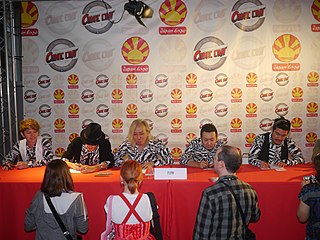
Takamasa Ishihara, better known by his stage name Miyavi, is a Japanese guitarist, singer-songwriter, record producer, and actor known for his finger-slapping style of playing a guitar.
Kick the Can Crew is a mainstream hip hop group from Tokyo, Japan, consisting of members Kreva, MCU, and Little.

Flow is a Japanese rock band formed in 1998 as a five-piece band made up of two vocalists, a guitarist, a bassist, and a drummer. They are signed to Sacra Music. As of February 2023, the band has released 39 singles and 12 studio albums. Their songs have been featured in the opening sequences of several anime and Japanese drama series.

The discography of Japanese R&B singer Misia consists of nine studio albums, three compilation albums, one extended play (EP), one live album, six remix albums, twenty-six singles, twelve promotional singles, eighteen video albums and thirty-seven music videos. In 1997, Misia signed a recording contract with BMG Japan and joined the then up-and-coming talent agency, Rhythmedia. Under the sub-label Arista Japan, Misia released her first single, "Tsutsumikomu Yō ni..." in February 1998, followed by "Hi no Ataru Basho" in May. In June, her debut album, Mother Father Brother Sister, opened at number three on the Oricon chart. The album peaked at number one three weeks later and stayed in the top five for eleven consecutive weeks. Mother Father Brother Sister was certified double million and won a Japan Record Award for Best Album, as well as a Japan Gold Disc Award for Pop Album of the Year. In 2000, Misia's second studio album, Love Is the Message, debuted at number one and was certified double million. It won a Japan Record Award for Best Album and a Japan Gold Disc Award for Pop Album of the Year. The album spawned three top ten hits: "Believe," "Wasurenai Hibi" and "Sweetness." Misia's first remix album, Misia Remix 2000 Little Tokyo, was released three months later and shot to number one. It sold over 800,000 copies and is the second best-selling remix album of all time in Japan.
The discography of Japanese contemporary R&B singer Crystal Kay consists of 12 studio albums, three extended plays, five compilation albums, four video albums and numerous single releases. Crystal Kay debuted as a singer at 13 years of age in 1999 under Epic Records Japan. Her third album Almost Seventeen (2002) saw a great leap in popularity for Crystal Kay, reaching number two on Oricon's albums chart. In 2005, Cyrystal Kay sung the eponymous theme song for the Tsuyoshi Kusanagi drama Koi ni Ochitara: Boku no Seikō no Himitsu. "Koi ni Ochitara" became Crystal Kay's most successful single, being certified for a million ringtone downloads.

7 Samurai Sessions -We're Kavki Boiz- is an album by Miyavi, released on July 18, 2007. It contains re-arrangements of previously published songs. It charted 44th on Oricon.

This Iz the Japanese Kabuki Rock is the sixth studio album by Miyavi. It was released on March 19, 2008. A limited edition was released on SHM-CD, a supposedly high-quality CD format developed by Universal, and includes a DVD featuring music videos and documentary footage. The album is advertised as the "final stage" of Miyavi's recent "Neo Visualizm" theme, and features the artist's performance troupe, the Kavki Boiz, including an MC, various instrumentalists, and other artists. The album charted 25th on Oricon and 27th on Billboard Japan.
Takashi Hatakeyama, better known by his stage name Kreva, is a Japanese rapper and record producer signed with the Burger Inn Records and Pony Canyon's Knife Edge labels. He is a solo artist as well as a member of various hip hop groups, including Kick the Can Crew, By Phar the Dopest with fellow MC Cuezero, and a large ensemble of other Japanese hip hop groups in Funky Grammar Unit.
Jasmine, is a Japanese singer and songwriter from Tokyo. She is represented by Sony Music Japan, and is a DJ for the Japanese radio station J-Wave. In June 2009 she released her debut single "Sad to Say". Described as "the next Hikaru Utada", Jasmine cites Utada as her influence.

Dsign Music is a renowned Norwegian songwriting and production team known for their exceptional contributions to the music industry. Founded in 2005 by Robin Jenssen, Anne Judith Stokke Wik, Nermin Harambašić, and Ronny Vidar Svendsen in Trondheim, Norway, Dsign Music has achieved remarkable success and recognition on a global scale.

Re:Born is the seventh full-length studio album released by Japanese recording artist Gackt on December 2, 2009, in Japan. It is conceptually linked to its predecessor Rebirth from 2001, and besides the music disc, contains an original audio drama.

The discography of Japanese-American singer-songwriter Ai consists of thirteen studio albums, four extended plays (EP), seven compilation albums, one live album, one mix tape, ten video albums and numerous solo and collaboration singles.

Gold Skool is the sixteenth studio album of Japanese singer Toshinobu Kubota, released on August 3, 2011. The album charted at number 3 on the Oricon Albums chart and remained on the charts for total of 18 weeks. The album sold over 78,124 units in Japan.

"Android" is the 35th Japanese single by South Korean pop duo Tohoshinki. It was released on July 11, 2012, as the third single from their sixth Japanese studio album, Time (2013). The digital single reached a total of 3.1 million in sales, the highest of any foreign artist in the country. "Android" was released in three editions – a CD+DVD version, a CD-only version, and a Bigeast Board edition.

Tree is the seventh Japanese studio album by South Korean pop duo Tohoshinki, released by Avex Trax on March 5, 2014. The record was released in four physical versions, each with a seasonal theme cover – Version A (Spring/Summer), a CD+DVD version with music videos; Version B (Autumn), another CD+DVD version with off-shot movies; Version C (Winter), a CD only version with two bonus tracks; and Version D, a fan club limited edition with a CD-Extra. Musically, Tree is a varied pop music album that is influenced by a broad range of musical genres, such as electronic dance music, hip hop, R&B, swing jazz, rock music, power ballads, and reggae. Recording for the album began well before the launch of their sixth Japanese studio album Time in early 2013.

Miyavi is the eighth studio album by Japanese musician Miyavi. It was released on June 19, 2013 in Japan, and on March and April 2014 in Europe and United States. It charted as number eight on Oricon and Billboard Japan.
What's My Name? is the seventh studio album by Japanese musician Miyavi. It was released on October 13, 2010, in Japan, featuring collaborations with various artists. The album charted as number twenty-six on Oricon and thirty-three on Billboard Japan.

"Hey What's Up?" is the third physical solo single by Japanese singer-songwriter Jin Akanishi, released on August 7, 2013.

"'Ai Naru Hō e'" is the fourth physical solo single by Japanese singer-songwriter Jin Akanishi, released on October 2, 2013.

Japanese musician Miyavi has released 15 studio albums, 2 EPs and 41 singles as of 2022. Chart rankings are weekly, unless otherwise stated.















